Arnon Grunberg's Blog, page 16
May 10, 2025
Grain
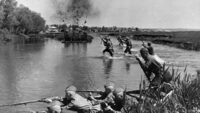 Theaters
TheatersOn the past – Susanne Beyer in Der Spiegel:
‘Eva Neidlinger, 34, is telling her story in a café in Babelsberg, the story of her and her great-grandfather. She reaches into her purse and unfolds a silk kerchief in which she has wrapped the pictures that her great-grandfather took so many decades ago. She pushes her teacup to the side and spreads the photos out on the table. Women in headscarves can be seen along with men in traditional clothing – and her great-grandfather in uniform. The uniform of the Wehrmacht, the military of Nazi Germany.’
(…)
‘The Wehrmacht occupied the territory of Ukraine and turned the country into one of the main theaters of fighting during World War II, with over 8 million deaths including an estimated 5 million civilians. With the knowledge of the Wehrmacht, and sometimes even with its help, German Sonderkommandos rounded up Jews and shot them, ultimately slaughtering around 1.5 million Jews on Ukrainian soil in this "Holocaust of Bullets.” Soldiers also took food from the starving population. Among the aims of the German war of annihilation was securing both the country’s grain supplies and the beautiful Crimean Peninsula.
Neidlinger’s ancestor was one of 17 million Wehrmacht soldiers. Most of them did not join voluntarily, but that changes nothing about the atrocities they committed. For men of military age living in Germany during World War II, it was normal to serve in the Wehrmacht. It was also part of normal life during the Nazi period to take part in crimes – or at least accept them by looking the other way.
The evidence is widely known: In 1945, ever fifth German adult was a member of the NSDAP, even though the party didn’t accept everybody and ceased admitting new members for many years. Concentration camps like Buchenwald, Dachau and Neuengamme were easily visible and located near towns and villages. In the territory of the German Reich, there were more than 20 concentration camps and over 1,000 satellite camps. In excess of 13 million people were pressed into service as forced laborers in factories, on construction sites, in small companies, on farms or in households and were thus part of everyday life in Germany. The possessions of deported Jews were expropriated and publicly auctioned off – with much of this looted property still being bequeathed to younger generations today.’
(…)
‘In 2002, the study "Grandpa Wasn’t a Nazi” was published, compiled by a team led by the social psychologist Harald Welzer. The study documents how in the stories that families told of their ancestors, anti-Semites were frequently transformed into resistance fighters.’
(…)
‘It seems as though there is an unspoken agreement that dealing with the Nazi period can be outsourced to the memorial sites and museums and that families themselves are absolved from doing so in all but the most drastic cases.’
(…)
‘A few weeks ago, Neidlinger attended a research seminar, where she learned how to work in archives and to approach historical documents. Historian Johannes Spohr, 42, has been giving such seminars since 2011 and says interest as recently been growing. A new generation is now joining in, Spohr says. In the past, his seminars were mainly attended by the grandchildren of the World War II generation, but now, great-grandchildren like Neidlinger are also enrolling.’
(…)
‘And yet there are a number of indications which, when taken together, seem to show that things are changing in Germany. The Working Group for Intergenerational Consequences of the Holocaust, an association for the descendants of both perpetrators and victims, has doubled in size, to 160 members, since the pandemic. That is, to be sure, not a huge number of members in absolute terms, but the trend is interesting. The association has been offering online events since the pandemic and has thus become better known among younger people. And the younger members, the association says, have mostly joined for political reasons – out of concern for Germany’s shift to the right.’
(…)
‘Stephan Lebert and the psychologist Louis Lewitan mention the phenomenon in their book – "Der blinde Fleck” or "The Blind Spot” – which was published in April. "The armor of silence” about the culpability of ancestors begins to break down once those ancestors are no longer alive, the publisher’s announcement notes: "Because they no longer have to fear confrontation with their grandparents or parents, more and more people have begun researching their family history and examining how it has affected their own lives.”’
(…)
‘Eva Niedlinger has devised an artistic expression to portray this mixture of curiosity and reticence that is so typical of Germans 80 years after the end of the war and National Socialism. She recently took part in the "Enkel:Innen” art project organized by the Schloss Wiepersdorf Cultural Foundation, where descendants of Holocaust survivors worked together with descendants of perpetrators on creating art works. Neidlinger came up with the idea of wrapping the human sculptures in the castle park.
What is wrapped can become visible. But someone must decide to unwrap them.’
Read the article here.
The past can be outsourced to museums and memorial sites. Both decent and convenient.
Now that most of the perpetrators are dead, one can confront the past that is seemingly less painful, less alive, or maybe one should say, alive in a different manner.
And some intergenerational artwork.
Forgiveness is for the descendants.
May 8, 2025
Example
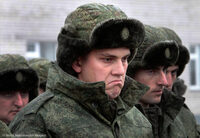 Members
MembersOn the blink of an eye – The Economist:
‘Russia may not be about to invade other parts of Europe. But it will try to gain sway by redoubling its cyber-attacks, influence operations, assassinations and sabotage. If Mr Putin senses weakness, he could seek to split apart nato by seizing a small piece of territory and daring the allies to respond. He could be ready for that in two to five years. This may sound a long time. In military planning it is the blink of an eye.’
(…)
Ukraine it has suffered almost 1m dead and wounded and, since its gains in the first weeks after the invasion, it has taken less than 1% more of Ukraine’s territory.
Many in the Baltic states, Poland and the Nordic countries go to the other extreme, warning that the threat is bigger than Mr Putin, because Russian imperialism has deep roots. That fear is understandable given their history of being mauled, but it is the wrong way to approach Russia. Not only does it affirm Mr Putin’s message that nato is incurably anti-Russian, but it makes Europe more likely to miss chances for detente.’
(…)
‘Russian tactics are crude and costly, but a sudden small incursion into a natomember would force nato to choose whether to take back lost ground and risk nuclear war. If it did not fight, nato would be broken. In a longer conflict nato could surely repel a first Russian offensive, but would it have the resources for a fifth or sixth? Mr Putin might count it a strategic victory if Mr Trump declined to turn up, even if Russia were pushed back. That is because America’s absence on the battlefield would entrench Russia’s influence over Europe.’
(…)
‘Europe is buying more arms. New figures from sipri, a Swedish think-tank, show that nato, excluding America, increased spending by $68bn, or 19%, in 2022-23. More is needed, but European leaders have still not prepared voters for the sacrifices ahead. They are squabbling over arms contracts. For example, Britain may not be allowed to join a European Union scheme unless it lets euboats fish in its waters.
Work is needed to enhance nato’s unity, especially if America no longer binds it together. It is naive to think that countries like Spain and Portugal will ever fear Russia as Estonia and Poland do. But they face threats to their infrastructure and politics. They also have a vital interest in the eu being spared the dysfunction that would result from greater Russian influence over its eastern members.
Last, Europe needs a Russia policy that looks beyond Ukraine.’
Read the article here.
Occupy a slice of Estonia. See that NATO doesn’t do much. Wait till NATO does.
Finish off the EU.
Side note, Germany will have its own nuclear weapons in a few decades or so. Power is going toi shift everywhere, also within Europe.
But maybe Putin is not up to the gamble of risking a nuclear war. After all, he has children.
Or maybe, he is up to it.
May 7, 2025
Many
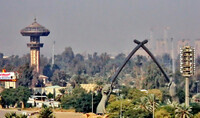 Push
PushOn the neocons all over again – Amir Tibon in Haaretz:
‘No single word is being used in a more negative way among supporters of President Donald Trump these days than "neocons," short for neoconservatives. This word, which originally described a specific school of interventionist thought in American foreign policy, is often associated with the presidency of George W. Bush, and specifically with the push to overthrow Saddam Hussein's regime, take over Iraq and install a different government there.
After the Iraq War turned out to be a total disaster, blaming the neoconservative thinkers and strategists who had supported it became a bipartisan sport in Washington. Barack Obama ran against their foreign policy in 2008 and 2012, and Donald Trump took over the Republican Party by promising to sideline them in 2016. But once he entered the White House, Trump chose many of the supposedly infamous neocons for top policy positions, including former National Security Advisor John Bolton and veteran State Department official Elliott Abrams.’
(…)
‘The experiment referred to in the prior paragraph is the Netanyahu government's plan to take over aid distribution in Gaza, first published by Barak Ravid over the weekend and later corroborated by senior Israeli officials in briefings to the Israeli press. It goes something like this:American companies will begin operating in southern Gaza, under the supervision of the Israeli military, in a "humanitarian compound" surrounded by barbed wire. Two million Gazan citizens will be concentrated in this compound to get food and aid, while Israel will take over the rest of Gaza and use the pressure put on Gaza's population in order to topple the Hamas regime.’
(…)
‘If all this sounds familiar to you, that means you've probably lived through the Iraq War and the "happy" days of American contractors operating under military guidance in an attempt to "separate the local population from the terrorists" and replace the regime, but it's unclear with what exactly.’
(…)
‘Two decades later, they are promoting their Gaza plan in similar fashion – and so far, despite all the rage about the "neocons disrupting his agenda," the president seems to buy it.’
Read the article here.
I was in Baghdad during the happy days of American contractors in the green zone and its surroundings.
The absurdities were numerous, to say the least.
Netanyahu seems to think that if you pile disaster upon disaster you will eventually win.
This is the Messianic belief, see Revelations, destruction first, Messiah later.
Socialism didn’t survive Stalinism very long. I’m not sure what kind of Israel we will have in twenty years, I’m not sure what kind of Israel we have today.
Chances are that the rebuilding of Israel will start in Berlin. In other words, I wrote about it before, that the bastard child of Zionism will be diasporism.
May 6, 2025
Importance
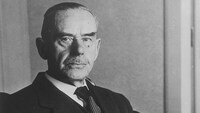 1896
1896On the gruesomeness – Gordon A. Craig in NY Books in 1982:
‘From the time he was a schoolboy in Lübeck until his death in Zurich in 1955, Thomas Mann kept a diary. Its purpose in the early years seems to have been to serve as a repository for stylistic exercises, drafts of stories, and copies of letters, but we have no exact knowledge of its contents because he burned all of the early volumes in 1896.’
(…)
‘Perhaps most of all, the literary importance of the diaries lies in the evidence they provide of the dedication and unfailing energy that Mann brought to his work. In February 1934 we find him, exiled from his country, horrified by the daily news of Nazi outrages and the loss of friends, suffering from headaches and insomnia, but nevertheless recording that he had been reading about Goethe and Hamann and Moritz after dinner and, before going to bed, had come upon “some new material for Joseph: some things on gardening, the care of palm trees, and the mystical connection between Ishtar and Ischallanu. The crucial conversation between Joseph and Potiphar became clearer to me.”’
(…)
‘And, two weeks later,I could have a certain amount of understanding for the rebellion against the Jewish element, were it not that the Jewish spirit exercises a necessary control over the German element, the withdrawal of which is dangerous: left to themselves, the Germans are so stupid as to lump people of my type in the same category and drive me out with the rest.
As time passed and the enormity of the Nazi regime was revealed, he was appalled, but less, one feels, because of the human suffering caused by Germany’s new rulers than because Hitler’s revolution pretended to be a cultural renascence and was accepted as such by the German people. In an interesting foreshadowing of his essay “Brother Hitler,” Mann wrote in his diary on September 8, 1933, that the totalitarian state hadat least one philosopher, a simple laborer whose head has been set spinning by the times, and who has been brought to power by the calamitous disorder of the day, a man who confounds his hysteria with artistic sensibility, his inner confusion with deep thinking, and without the least doubt or compunction undertakes to impose upon a people with an intellectual tradition as great as Germany’s his own thickheaded opinions.’
(…)
‘Meanwhile, what he called “the gruesomeness of German history” had to play itself out and, as it did, the exile, moving from Switzerland to Princeton to California, went methodically about his work. “Detachment, detachment!” he wrote at the height of the Sudeten crisis. “One must restrict oneself to his own immediate concerns and the life of the mind. I require serenity and the consciousness of my favored existence. Impotent hatred must not consume me.’
Read the article here.
The Jewish spirit controlling the German element?
The gruesomeness of German history played itself out, and we cannot say that the gruesomeness of history itself came to an end.
May 5, 2025
Oblivion
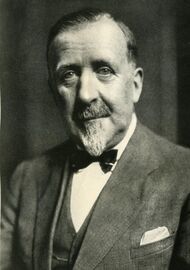 Blue Angel
Blue AngelOn the brothers – David Blackbourn in LRB (in 1998):
“Twenty years ago Nigel Hamilton wrote a double biography of the literary Brothers Mann, giving equal billing to the celebrated Thomas and the neglected Heinrich. It was certainly time to look again at Heinrich, whose importance as a public and literary figure had been taken for granted by an earlier generation of writers. Gottfried Benn called him ‘one of my gods’; Lion Feuchtwanger thought him the greatest of the writers who had set out not only to depict the 20th century but to change it. Hamilton made a strong case that Heinrich Mann deserved to be remembered as more than just the author of the book on which The Blue Angel was based.”
(…)
“All the more reason to welcome the translation into English (even if it is often dreadful English) of the correspondence between a great writer and one who does not deserve his current oblivion. Thomas liked to think of himself as a seismograph of his times. On the evidence of their letters, the faulted relationship between the brothers provides an even better fix on the rumbles of war, Communism, Fascism and exile.
Heinrich was born in 1871, Thomas four years later. They were the oldest of five children in a Lübeck patrician family. Both of their sisters, the bohemian Carla and neither Heinrich nor Thomas was ever close to their much younger brother Viktor. Their own relationship was difficult. ‘Heinrich,’ Thomas said, ‘could be so hurtful’ – but Thomas learnt to repay him with interest. They grew up with much in common. Children of Imperial Germany, they belonged to a generation of bourgeois youth that felt stifled by contemporary materialism and moral codes. Heinrich was the open rebel, Thomas’s alienation more inward – a pattern that persisted.”
(…)
“In a key letter from the time of his engagement, Thomas writes that he regards happiness as serious, difficult and severe, something to which he has submitted himself.”
(…)
“The two were finally reconciled in 1922, when Heinrich was seriously ill with peritonitis.
In the same year, Thomas embraced democracy in a speech ‘On the German Republic’, a symbolic moment in the process of distancing himself from apolitical conservatism. He continued to harbour private reservations about his brother’s work, but the two were now public allies. Both enjoyed huge success in the Twenties. Heinrich, even more prolific than before, was one of the premier writers of Weimar and talked about as a possible President of the Republic. Thomas, who still found writing an act of ‘perpetual hesitation’, won the Nobel Prize for literature in 1929 – for Budden-brooks, not for The Magic Mountain, which had appeared in 1924. There are relatively few letters from these years, when the two saw each other often.
It is no surprise that political events play an increasingly central role. In 1932, Heinrich writes: ‘I share your opinion that overt barbarism will be unable to prevail in this country.’ When it did, both brothers became exiles, Heinrich in the South of France, Thomas in Zürich, where he could remain within the ‘sphere of German culture’.”
(…)
“Nor was it just the brothers whose lives were affected. Heinrich’s first wife, Maria Kanova, died after five years in a concentration camp; his daughter, Goschi, was stranded in Prague after contracting a disastrous marriage; his second wife, Nelly Kröger, eventually succeeded in her third suicide attempt. Thomas’s son, Klaus, took his own life after the war. Not all these tragedies were a direct outcome of exile and war: it was clearly not easy at the best of times to be a member of the Mann family. Belonging to the first family of anti-Fascism made it that much harder.
The two brothers spent most of the war in the USA. Thomas, despite occasional disdain for the ‘naive eagerness’ of America, was much more at home there – a crowning irony, given his First World War diatribe against the shallow, materialistic ‘civilisation’ of the Entente powers. He had first visited the country in 1934, reporting enthusiastically on Roosevelt, La Guardia and New York City (‘the only true metropolis in the world’). The following year he collected an honorary degree at Harvard and met FDR. By 1938, when he and Katja decided to move there permanently, he had extensive contacts and an offer to teach at Princeton. Heinrich, who crossed the Atlantic reluctantly in 1940, never really found his feet in the New World. By 1941, the two were reunited in Hollywood. The later letters show how much the balance of their relationship had shifted. Thomas was famous and financially secure, Heinrich an unemployed screenwriter who could not find a publisher and depended on hand-outs from his younger brother.”
(…)
“homas found himself branded a Communist ‘dupe’, attacked in Time magazine and Congress for fellow-travelling. In 1952, three years before his death, he returned with Katja to Europe.
On Heinrich’s 70th birthday in 1941, Thomas had welcomed his brother to America: ‘When the homeland becomes foreign, the foreign becomes the homeland. Most profoundly foreign to us today is Germany, that savage, reckless, and disintegrated country of our heritage and language.’ Four years later, returning the birthday honours, Heinrich quoted Thomas’s well-known remark upon arrival in the US – ‘Where I am, there is German culture’. The claim could be made of both men. The arc of their lives, from Lübeck on the Trave to exile, from enmity to partnership, had a representative quality – right to the end. Heinrich died as a Czech citizen in the US, Thomas as an American citizen in Switzerland.”
Read the article here.
Happiness is no fun. A married life can be worse than happiness.
Perhaps time to read Heinrich Mann.
And I would love to die as an American citizen in Switzerland.
It’s my dream.
One of my many dreams.
May 4, 2025
Contenders
 Alluring
AlluringOn spiritual hunger -- Charles Foster in TLS:
‘This view of reality would doubtless be alluring to Abi Millar, a successful, secular thirtysomething journalist who has rejected the evangelical Christianity of her childhood, but “feels a spiritual hunger very acutely”, though she struggles “to define what that hunger represents”. She hasn’t “signed up to living a life devoid of purpose”, but wants “to define that purpose in [her] own terms”. She knows that spirituality is “her basic programming”, the “deepest stratum” of her life, and knows that worship is as much part of human life as breathing. She quotes David Foster Wallace: “Everyone worships. The only choice we get is what to worship. And the compelling reason for maybe choosing some sort of god or spiritual-type thing to worship … is that pretty much anything else you worship [such as money, power, intellect and physical beauty] will eat you alive.” Dreher would heartily agree, adding only the caveat that many gods and “spiritual-type things” will eat you alive too.
Millar’s problem is: “How on earth are you supposed to select your ‘god or spiritual-type thing?’”. There are so many contenders.’
(…)
‘Second, he could side again with Bentley Hart, and with a reputable strand of Christian (including Orthodox) belief, and say that God is so merciful and powerful that all will be saved. This should be uncontroversial. (It’s not). The great Orthodox Easter hymn shouts that “death has been trampled by death” – the death of Christ. If that’s right, death is dead. For everyone. The death of death doesn’t depend on anyone’s assent to a theological proposition, on their attendance at church, on their self-identification as Christian or on membership of any club other than that of the human race. It’s just a fact.
I bet if Rod Dreher persuaded the church to do that, Abi Millar would join him on a Sunday. But I bet, too, that he thinks that to suggest it makes me an agent of Lucifer himself.’
Read the article here.
So, our true addiction is worshipping? Most people would like to worship themselves. Everything else they worship is just to worship themselves better.
May 3, 2025
Soul
 Governments
GovernmentsOn a soul – Daniella Peled in Haaretz:
‘A public letter critical of Israel's war in Gaza signed by dozens of members of the representative body of British Jewry has exposed deep fissures in the community over Israel.
Community representatives say the furor goes to the heart of who genuinely represents Anglo-Jewry, with time-honored lines of communication between Israel and mainstream Jewish organizations now being bypassed.
Published in the Financial Times on April 16 and signed by 36 deputies – as the elected members of the representative body are known – the letter excoriates the actions of "this most extremist of Israeli governments," and warns that "Israel's soul is being ripped out."
(…)
‘"This is just airing our dirty linen in public," says Nicole Lampert, a freelance journalist and Jewish Chronicle columnist. "The letter reflects conversations going on across the Jewish world, but is it going to make things better for those in the Diaspora suffering from appalling levels of antisemitism? We're a community in a huge amount of pain, and this is just picking at the scab."
But as the celebrated Anglo-Jewish writer Chaim Bermant wrote decades ago: "One is always accused of 'washing dirty linen in public' and of 'giving ammunition to our enemies. … But if linen isn't washed in public, it isn't washed in private either and is generally allowed to accumulate until it stinks to heaven."’
(…)
‘According to July 2024 polling by the Institute for Jewish Policy Research, around two-thirds of British Jews (65 per cent) identify as Zionist, although they are increasingly worried about the state of Israeli democracy.
Polling also shows some division in attitudes between secular and more Orthodox Jews, with the communal leadership long dominated by more conservative and religious figures who tend to be more reluctant to criticize the Jewish state.’
(…)
‘In the United Kingdom, where the Jewish community is very well established and organized, that process has long run seamlessly, with clear channels of dialogue on issues ranging from antisemitism to the Israel-Palestine conflict. If this situation changes, Israel may not be able to rely on the staunch Diaspora support it has long taken for granted.’
Read the article here.
Absolutely, is the linen isn’t washed in public it isn’t washed at all.
Real existing Zionism (Israel) will divide Judaism, it has become new Sabbatai Zevi, this disguised as nation state.
The washing of the real dirty linen hasn’t even started.
Injunctions
 Sensations
SensationsOn Etty Hillesum - Neal Ascherson in 1984 in NYRB:
‘Etty Hillesum was a young woman, a Dutch Jew, who lived in Amsterdam. She was twenty-six when the Nazi occupation of the Netherlands took place. In the spring of 1942, the mass deportations of the Jews began, at first to the huge transit camp of Westerbork in eastern Holland.’
(…)
‘Etty Hillesum was an intellectual who wanted to be a writer. She kept a diary from 1941 onward, but the diary is at first hardly at all and later only indirectly the story of the destruction of the Jews in Holland. It is about herself and her relationships, initially about friends and lovers and then, increasingly, about her own very individual vision of a God. Etty came from a gifted, scholarly family in Deventer, studied law and Slavonic languages at the University of Amsterdam and then applied herself to psychology. By the time the journal begins, Etty had almost completed one major subjective struggle; she had become an independent and sexually liberated young woman, with only residual doubts about her own rather startling style of life, only spasmodic anxieties about the position of men and women. The diaries themselves record a second struggle, as Etty Hillesum in a sense abandons herself to find herself. The notes and entries are at first concerned with expanding her own sensibility, with rhapsodic accounts of emotions and sensations, with injunctions to herself to put more effort into her own self-realization as a writer.’
(…)
‘It would be impossible, for instance, to learn from her diary that Amsterdam was the only German-occupied city in Western Europe in which Jews organized themselves to fight physically on the streets against their persecutors.
My acceptance is not indifference or helplessness. I feel deep moral indignation at a regime that treats human beings in such a way. But events have become too overwhelming and too demonic to be stemmed with personal resentment and bitterness. These responses strike me as being utterly childish and unequal to the fateful course of events…. It is not as if I want to fall into the hands of destruction with a resigned smile—far from it. I am only bowing to the inevitable and even as I do so I am sustained by the certain knowledge that they cannot rob us of anything that matters.
(…)
She does not exactly “find God,” but rather constructs one for herself. The theme of the diaries becomes increasingly religious, and many of the entries are prayers. Her God is someone to whom she makes promises, but of whom she expects and asks nothing.’
(…)
‘At the time she was living with, or at least sharing the bed of, her landlord, a man in his sixties. But she was on the brink of a new affair with another man much older than herself, and her portrait of this extraordinary person, enriched in entry after entry as she came to love him more deeply, is an unforgettable literary feat. Julius Spier, who was fifty-four when Etty encountered him, was a German-Jewish refugee. He had been a banker and a publisher before becoming, after training analysis under Jung in Zurich, the founder of “psychochirology.” Spier read palms, using palmistry as the foundation for his own strange and liberating brand of analysis. He also practiced therapy by wrestling with his patients, grappling with them, and forcing them to the ground (or sometimes, as with Etty, being floored himself), a technique whose strongly sexual connotations he in no way rejected.’
(…)
‘But he remained for her a liberator. It was not merely that the “magical personality” for which he is remembered steadied and calmed her. Etty learned the self-abnegation that became her creed in the last months in part by overcoming her own possessiveness about Spier, and by recognizing that this was a man she must share with others.’
(…)
‘The Bible and Tolstoy were safely in her rucksack when they closed the doors on her. Later, farmers near the German border found a postcard she had thrown out of the train. It read: “We have left the camp singing.”’
Read the review here.
In her diaries there is an entry that we should not spare the reader.
‘Anne-Marie heard a mother say this to her child on the heath: 'And if you don't eat your pudding sweetly, you'll have to be transported without your mommy!’
What else is there to say: eat your pudding, othewise you will be dported without your mummyy.
Perhaps this is what the undocumented migrants in the US tell their children.
Eat your pudding. Otherwise you will be deported without your mummy.
May 1, 2025
Citizens
 Tumult
TumultOn change - The Economist:
‘Having long relied on China’s market for growth, Russian gas to fuel its industry and American military heft for security, the eu has been rocked by three years of war in Ukraine and three months of Donald Trump’s agressive transactionalism in America. Amid the tumult that reigns in the world, Europe must embrace change.’
(…)
‘Europe is a shrinking force in the global economy. It is a luxury to pretend otherwise.’
(…)
‘One particularly decadent trait of Europe’s has been to put off problems until they become so acute that fixing them costs a fortune. Take the continent’s perilous demography. Europe in 1980 had around five working-age citizens in effect paying for every pensioner. Now it has three—and by 2050 there will be just two workers per pensioner. Some solutions to rectify the balance seem appealing but are impractical. Pushing Europeans to have more babies has proved unsuccessful; importing migrants is politically contentious. Eschewing the obvious solution of getting people to work longer, for example by linking retirement ages to life expectancies, is one of those luxuries now beyond Europe’s means.’(…)
‘ Aiding Ukraine is no indulgence, on the contrary. Nor is financing the welfare state, to which many Europeans are attached. But to focus on what really matters requires understanding that a changing world requires changing priorities, too.’
Read the article here.
Europe has been called decadent for almost as long as I live.
But yes, the world is changing indeed, so priorities must change.
Will Europe become one big Switzerland?
It is already one big Switzerland?
Who is going to die for Ukraine? Only Ukrainians?
To call Trump’s policies ‘aggressive transactionalism’ is rather beautiful.
Perhaps we should hope for modest transactionalism, benign you-scratch-my-back etcetera.
April 30, 2025
Things
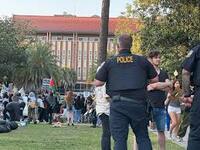 Without
WithoutOn expulsion – Peter Beinart in NYT (thanks to my friend P):
‘On April 29, 2024, Tess Segal, a 20-year-old sophomore at the University of Florida, joined her fellow activists at a prominent plaza on campus calling on the university to divest from weapons manufacturers and boycott academic institutions in Israel. Some protesters studied or played cards. Later they read obituaries of Palestinians killed in the Gaza Strip.
Then law enforcement moved in. And although Ms. Segal says she did not resist arrest, she was handcuffed and taken to jail, where she was held overnight.
Ms. Segal was charged with resisting arrest without violence. The state later dismissed her case. The University of Florida, however, had already banned her from campus. University officials had warned protesters that they could be punished if they violated tough new restrictions on protest. Administrators also said that officers had instructed the demonstrators to disperse. Ms. Segal said it was too loud to hear that directive.
Ms. Segal told me that she was barred from taking her final exam of the semester and participating in a school-sponsored summer program to which she had been admitted. A university disciplinary committee ruled that she had not acted in a disruptive manner but deemed her responsible for violating university policy, among other things. It proposed a one-year suspension. The university’s newly installed dean of students went further. In a letter shared by the Foundation for Individual Rights and Expression, he declared that Ms. Segal’s conduct “caused major disruption to the normal functions of the university and prevented law enforcement officers from performing their duties promptly” and boosted her suspension to three years. (The university would not officially confirm or comment on events surrounding Ms. Segal’s suspension, pointing out that it’s protected information under privacy laws.)
The University of Florida requires any student absent for more than three semesters to reapply for admission. Ms. Segal said she had been on a full scholarship. She now works in food service and doesn’t know how or when she’ll return to college.’
(…)
‘Since Oct. 7, 2023, several prominent Jewish organizations and their political allies have repeatedly demanded that universities protect Jewish students by punishing violations of campus conduct and protest, including with suspension or even expulsion. Ms. Segal is the granddaughter of a Holocaust survivor. She’s an alumna of a Jewish summer camp. Why weren’t Jewish organizations concerned about her? Because over the past few years, mainstream American Jewish leaders — in partnership with sympathetic politicians — have done something extraordinary: They have effectively redefined what it means to be a Jew. To silence condemnation of Israel, they have equated support for the state with Jewishness itself.’
(…)
‘Many American Jews, particularly young Jews, hold critical views about Israel. A 2021 poll by the centrist Jewish Electoral Institute, which monitors Jewish voting engagement, found that 38 percent of American Jewish adults under the age of 40 considered Israel an apartheid state, compared with 47 percent who did not. When presented with the accusation that Israel was committing genocide in Gaza in a survey last year, 38 percent of American Jewish adults under the age of 44 agreed.’
(…)
‘There is a deep irony in the American Jewish establishment’s apparent questioning of the Jewishness of these young dissenters. Because what distinguishes today’s Jewish student activists from earlier generations of American Jewish leftists is precisely their interest in incorporating Jewish ritual itself into their protests. In New York alone, at least 10 non-Zionist or anti-Zionist minyanim, or prayer communities, have sprouted in the past several years. They’re overwhelmingly populated by Jews not much older than Ms. Segal.’
Read the article here.
The good Jew and the non-Jew i.e. the not so good Jew.
There was a time that a totalitarian regime decided who was a Jew and who wasn’t.
Once again, the question comes up. And it’s not a rabbinical question.
If the fight against antisemitism is used to frighten protesters, to silence dissent, the future for the Jews appears to be bleak.
Arnon Grunberg's Blog
- Arnon Grunberg's profile
- 415 followers



